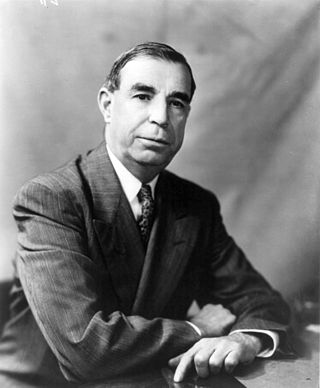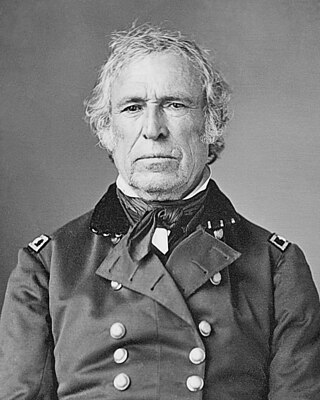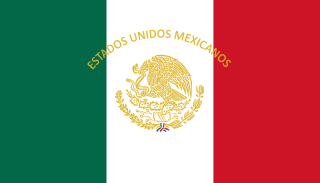Related Research Articles

James Knox Polk was the 11th president of the United States, serving from 1845 to 1849. A protégé of Andrew Jackson and a member of the Democratic Party, he was an advocate of Jacksonian democracy and extending the territory of the United States. Polk led the U.S. into the Mexican–American War, and after winning the war he annexed the Republic of Texas, the Oregon Territory, and the Mexican Cession.

Mexico City is the capital and largest city of Mexico, and the most populous city in North America. It is one of the most important cultural and financial centers in the world. Mexico City is located in the Valley of Mexico within the high Mexican central plateau, at an altitude of 2,240 meters (7,350 ft). The city has 16 boroughs or demarcaciones territoriales, which are in turn divided into neighborhoods or colonias.

Albuquerque, also known as ABQ, Burque, the Duke City, and in the past 'the Q', is the most populous city in the U.S. state of New Mexico. Founded in 1706 as La Villa de Alburquerque by Santa Fe de Nuevo México governor Francisco Cuervo y Valdés, and named in honor of Francisco Fernández de la Cueva, 10th Duke of Alburquerque and Viceroy of New Spain, it served as an outpost on El Camino Real linking Mexico City to the northernmost territories of New Spain.

Winfield Scott was an American military commander and political candidate. He served as Commanding General of the United States Army from 1841 to 1861, and was a veteran of the War of 1812, American Indian Wars, Mexican–American War, and the early stages of the American Civil War. Scott was the Whig Party's presidential nominee in the 1852 election but was defeated by Democrat Franklin Pierce. He was known as Old Fuss and Feathers for his insistence on proper military etiquette and the Grand Old Man of the Army for his many years of service.

Maximilian I was an Austrian archduke who became emperor of the Second Mexican Empire from 10 April 1864 until his execution by the Mexican Republic on 19 June 1867.

Lázaro Cárdenas del Río was a Mexican army officer and politician who served as president of Mexico from 1934 to 1940. Previously, he served as a general in the Constitutional Army during the Mexican Revolution and as Governor of Michoacán and President of the Institutional Revolutionary Party. He later served as the Secretary of National Defence. During his presidency, which is considered the end of the Maximato, he implemented massive land reform programs, led the expropriation of the country's oil industry, and implemented many key social reforms.

Chili con carne, often shortened to chili, is a spicy stew of Mexican origin containing chili peppers, meat, tomatoes, and often pinto beans or kidney beans. Other seasonings may include garlic, onions, and cumin.

Nachos are a Tex-Mex culinary dish consisting of tortilla chips or totopos covered with cheese or cheese sauce, as well as a variety of other toppings and garnishes, often including meats, vegetables, and condiments such as salsa, guacamole, or sour cream. At its most basic form, nachos may consist of merely chips covered with cheese, and served as an appetizer or snack, while other versions are substantial enough to serve as a main course. The dish was created by, and named after, Mexican restaurateur Ignacio "Nacho" Anaya, who created it in 1943 for American customers at the Victory Club restaurant in Piedras Negras, Coahuila.

Plutarco Elías Calles was a Mexican politician and military officer who served as President of Mexico from 1924 to 1928. After the assassination of Álvaro Obregón, Elías Calles founded the Institutional Revolutionary Party and held unofficial power as Mexico's de facto leader from 1929 to 1934, a period known as the Maximato. Previously, he served as a general in the Constitutional Army, as Governor of Sonora, Secretary of War, and Secretary of the Interior. During the Maximato, he served as Secretariat of Public Education, Secretary of War again, and Secretary of the Economy. During his presidency, he implemented many left-wing populist and secularist reforms, opposition to which sparked the Cristero War.

Clinton Presba Anderson was an American politician who represented New Mexico in the United States Senate from 1949 until 1973. A member of the Democratic Party, he previously served as United States Secretary of Agriculture from 1945 until 1948 and represented New Mexico's at-large congressional district from 1941 until 1945.

Dionisio "Dennis" Chávez was an American politician who served in the United States House of Representatives from 1931 to 1935, and in the United States Senate from 1935 to 1962. He was the first Hispanic person to be elected to a full term in the US Senate and the first US Senator to be born in New Mexico, which was still a US territory at the time of his birth. In 1920, he became the first Latino lawyer in the United States.

Rafael Osuna Herrera , nicknamed "El Pelón", was a former world No. 1 tennis player, the most successful player in the history of Mexico and an Olympian. He was born in Mexico City, and is best remembered for his singles victory at the U.S. Open Championships in 1963, winning the 1960 and 1963 Wimbledon Doubles championships, the 1962 U.S. Open Championships doubles, and for leading Mexico to its only Davis Cup Final round appearance in 1962. He is the only Mexican to date to be inducted into the International Tennis Hall of Fame, in 1979.

Ben Ray Luján is an American politician who has served as the junior United States senator from New Mexico since 2021. He served as the U.S. representative for New Mexico's 3rd congressional district from 2009 to 2021 and as Assistant Speaker from 2019 to 2021. He served as a member of the New Mexico Public Regulation Commission from 2005 to 2008, where he also served as chairman. He and Senator Martin Heinrich are the co-deans of New Mexico's congressional delegation.

Santa Fe is the capital of the U.S. state of New Mexico, and the county seat of Santa Fe County. With over 89,000 residents, Santa Fe is the fourth-most populous city in the state, and part of the Albuquerque–Santa Fe–Los Alamos combined statistical area, which had a population of 1,162,523 in 2020. Situated at the foothills of the Sangre de Cristo Mountains, the city is at the highest altitude of any U.S. state capital, with an elevation of 6,998 feet.

Zachary Taylor was an American military officer and politician who was the 12th president of the United States, serving from 1849 until his death in 1850. Taylor was a career officer in the United States Army, rising to the rank of major general and becoming a national hero for his victories in the Mexican–American War. As a result, he won election to the White House despite his vague political beliefs. His top priority as president was to preserve the Union. He died 16 months into his term from a stomach disease. Taylor had the third-shortest presidential term in U.S. history.

The Mexican–American War, also known in the United States as the Mexican War, and in Mexico as the United States intervention in Mexico, was an invasion of Mexico by the United States Army from 1846 to 1848. It followed the 1845 American annexation of Texas, which Mexico still considered its territory because it refused to recognize the Treaties of Velasco, signed by President Antonio López de Santa Anna after he was captured by the Texian Army during the 1836 Texas Revolution. The Republic of Texas was de facto an independent country, but most of its Anglo-American citizens who had moved from the United States to Texas after 1822 wanted to be annexed by the United States.

Chihuahua, officially the Free and Sovereign State of Chihuahua, is one of the 31 states which, along with Mexico City, comprise the 32 federal entities of Mexico. It is located in the northwestern part of Mexico and is bordered by the states of Sonora to the west, Sinaloa to the southwest, Durango to the south, and Coahuila to the east. To the north and northeast, it shares an extensive border with the U.S. adjacent to the U.S. states of New Mexico and Texas. The state was named after its capital city, Chihuahua City; the largest city is Ciudad Juárez. In 1864 the city of Chihuahua was declared capital of Mexico by Benito Juarez during the Reform War and French intervention. The city of Parral was the largest producer of silver in the world in 1640. During the Mexican War of Independence, Miguel Hidalgo was executed on July 30, 1811, in Chihuahua city.

Antonio de Padua María Severino López de Santa Anna y Pérez de Lebrón, usually known as Antonio López de Santa Anna, or just Santa Anna, was a Mexican soldier, politician, and caudillo who served as the 8th president of Mexico on multiple occasions between 1833 and 1855. He also served as vice president of Mexico from 1837 to 1839. He was a controversial and pivotal figure in Mexican politics during the 19th century, to the point that he has been called an "uncrowned monarch", and historians often refer to the three decades after Mexican independence as the "Age of Santa Anna".

The president of Mexico, officially the president of the United Mexican States, is the head of state and head of government of Mexico. Under the Constitution of Mexico, the president heads the executive branch of the federal government and is the commander in chief of the Mexican Armed Forces. The office, which was first established by the federal Constitution of 1824, is currently held by Claudia Sheinbaum, who was sworn-in on October 1, 2024. The office of the president is considered to be revolutionary, in the sense that the powers of office are derived from the Revolutionary Constitution of 1917. Another legacy of the Mexican Revolution is the Constitution's ban on re-election. Mexican presidents are limited to a single six-year term, called a sexenio. No one who has held the post, even on a caretaker basis, is allowed to run or serve again. The constitution and the office of the president closely follow the presidential system of government.
Roberto Córdova was a Mexican jurist, international judge, and diplomat. Córdova served as a judge for the International Court of Justice (ICJ) between 1955 and 1964. He was the second Mexican to serve as an ICJ judge, following Isidro Fabela.
References
- ↑ "Perfil del legislador". Legislative Information System. Retrieved 25 May 2014.